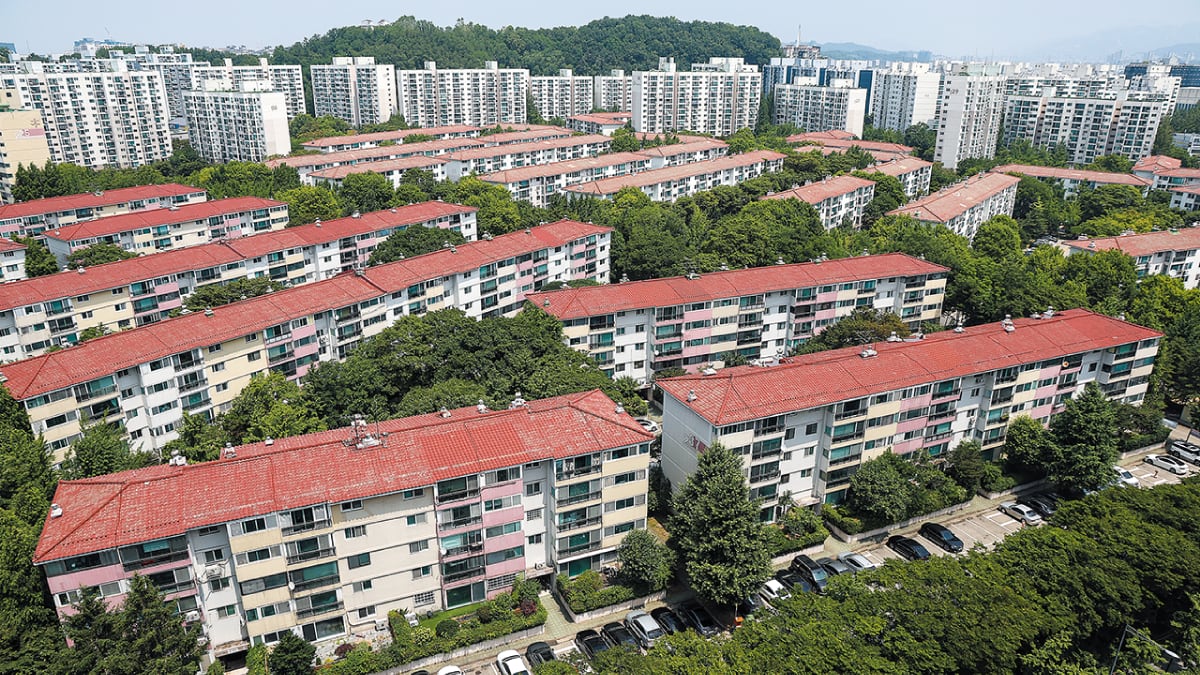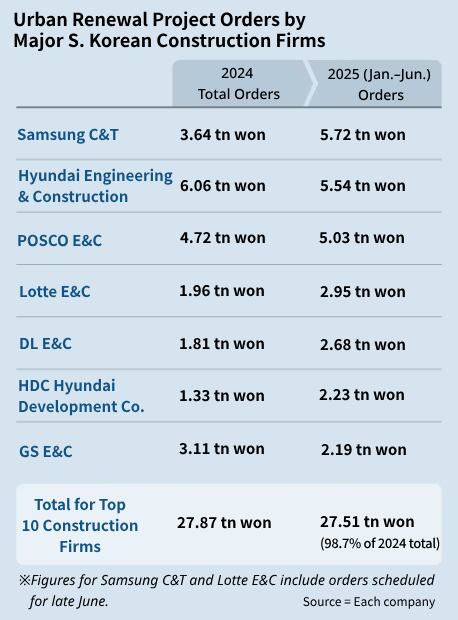South Korean builders pivot to redevelopment amid drop in public orders

South Korea’s 10 largest construction firms secured more than 27 trillion won ($19.5 billion) in urban renewal contracts—including redevelopment, reconstruction, and remodeling—during the first half of 2025, surpassing 98 percent of last year’s full-year total. With several major bids scheduled for the second half, the industry expects this year’s total to reach a record high.
Samsung C&T Corporation (Construction Division) led the first-half performance. In January, the company won a 1.57 trillion won ($1 billion) redevelopment contract for Hannam District 4, followed by deals for Sinbanpo Phase 4 (1.03 trillion won) and the public redevelopment of Jangwi District 8 (1.19 trillion won). If it wins the Ulsan Nam District B-04 redevelopment project, slated for announcement in late June, Samsung’s total for the first half would climb to 5.72 trillion won ($4.2 billion)—up 55.5 percent from the previous year’s 3.64 trillion won.
Hyundai Engineering & Construction Co. also posted strong results, securing 1.51 trillion won for the reconstruction of Gaepo Jugong Apartment Complexes 6 and 7 in May, along with a 1.96 trillion won redevelopment project in Sutaek-dong, Guri—described as the largest of its kind in South Korean history. The company’s first-half total reached 5.54 trillion won ($4 billion). POSCO E&C followed closely at 5.03 trillion won, trailed by Lotte E&C at 2.95 trillion won and DL E&C at 2.68 trillion won. Each of the five firms recorded more than 2 trillion won in urban renewal orders in the six-month period.

Redevelopment and reconstruction projects have traditionally been viewed as high-value contracts in the construction sector, given their large scale and prime locations, which reduce the risk of unsold units. However, in recent years, surging construction costs have placed additional financial burdens on both residents and developers, sparking disputes and dampening enthusiasm across the industry. Many firms stepped back from aggressively pursuing such projects.
That trend shifted this year. Amid a prolonged downturn in the construction market and a contraction in public-sector infrastructure contracts—exacerbated by last year’s presidential impeachment and this year’s general election—private-sector urban renewal has regained momentum. Analysts point to rising housing prices in Seoul and an ongoing shortage of new supply in the capital region as key factors fueling renewed demand.
According to the Korea Research Institute for Construction Policy, the construction progress payment amount—a key real-time indicator of industry activity—stood at 26.87 trillion won ($19.7 billion) in the first quarter (January to March), down 21.2 percent year-on-year. The metric reflects the value of work completed on ongoing projects and signals a marked decline in active construction volume.
“Public sector projects have fixed budgets, but redevelopment and reconstruction allow for cost negotiations, making them more profitable,” a construction company official said.
Lee Eun-hyung, a senior researcher at the Korea Research Institute for Construction Policy, noted, “The previous administration and the Seoul Metropolitan Government promoted urban renewal, and we are now seeing the results as large-scale bids begin to materialize this year. With limited new housing supply in the capital and a growing stock of aging apartment complexes, redevelopment, reconstruction, and remodeling projects are likely to continue expanding.”
Construction firms are also becoming more selective, prioritizing projects with strong profitability potential. Rather than competing in non-metropolitan areas where unsold inventory is rising, companies are focusing their bids on the Seoul metropolitan area. During tender processes, firms are increasingly opting out of bids for sites that fall short of prime location criteria. Industry observers warn that escalating costs tied to financing, relocation assistance, and marketing could lead to situations where project expenses exceed expected returns.
Posting Komentar untuk "South Korean builders pivot to redevelopment amid drop in public orders"
Posting Komentar